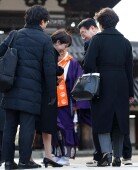``To Suspend Electricity Aid To NK By U.S. Request``
``To Suspend Electricity Aid To NK By U.S. Request``
Posted August. 01, 2001 19:56,
A high-ranking official said that the U.S. requested South Korea to suspend its negotiations with North Korea over North Korea`s call for the electricity aid
The United States requested South Korea to suspend its negotiations with the North over Pyongyang`s call for 500,000 kW of electricity aid at the fourth South-North ministers` talk last December.
Jung Se-Hyun (former vice unification minister), special assistant of unification to the chief of the National Intelligence Service, said in the latest edition of `East Asian Review` published by the Institute for Far Eastern Studies that ``the biggest issue in relation to the aid to North Korea is the 500,000 kW of electricity aid. North Korea called for the electricity aid, and South was willing to negotiate. However, the negotiations were put on hold by the U.S. request.``
Jung said that ``the U.S. may need to revise the North-U.S. Geneva agreement to aid the construction of thermoelectric power station instead of light-water reactor. In this situation, the U.S. was probably concerned that its negotiating leverage with North may weaken if South agrees on the electricity aid and provides the aid.``
Jung said, ``As the U.S. administration appears to rule out the revision of the Geneva agreement, it discusses a possibility to aid 500,000 kW-capacity thermoelectric power plants in addition to the 2 million kW light-water reactors as a key to solve the issue of missile and nuclear weapons. However, it is desirable to leave this issue to South-North.``
Jung also said that electricity aid should be able to guarantee the North Korea leader Kim Jong-Il`s return visit to Seoul and at the same time can be an important agenda of the second inter-Korean summit. Moreover, electricity aid can be a variable that enables the concrete discussion to reduce the military tension between South-North, said Jung.
However, as the article creates a stir, Jung clarified saying that ``when I wrote this article in April, I did not have any special information since it was before I was appointed to the special assistant to the chief of the NIS. I assumed that as the U.S. has used the conventional weapons as a hidden card in its negotiations with North, the U.S. has tried to use the strategic issue as a hidden card as well.``
Lee Chol-Hi klimt@donga.com






![[단독]“물건 보냈는데 돈 안와”… 국제정세 불안에 수출대금 8000억 떼일 위기](https://dimg.donga.com/c/138/175/90/1/wps/NEWS/IMAGE/2026/01/15/133160131.1.jpg)
